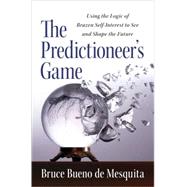
| Introduction | p. ix |
| What Will It Take to Put You in This Car Today? | p. 3 |
| Game Theory 101 | p. 10 |
| Game Theory 102 | p. 29 |
| Bombs Away | p. 47 |
| Napkins for Peace: Defining the Question | p. 66 |
| Engineering the Future | p. 86 |
| Fast-Forward the Present | p. 103 |
| How to Predict the Unpredictable | p. 124 |
| Fun with the Past | p. 140 |
| Dare to Be Embarrassed! | p. 171 |
| The Big Sweep: The History of Worms, or Bali High, Bali Low | p. 203 |
| Acknowledgments | p. 227 |
| Appendices | p. 231 |
| Notes | p. 235 |
| Index | p. 241 |
| Table of Contents provided by Ingram. All Rights Reserved. |
The New copy of this book will include any supplemental materials advertised. Please check the title of the book to determine if it should include any access cards, study guides, lab manuals, CDs, etc.
The Used, Rental and eBook copies of this book are not guaranteed to include any supplemental materials. Typically, only the book itself is included. This is true even if the title states it includes any access cards, study guides, lab manuals, CDs, etc.
Excerpted from The Predictioneer's Game: Using the Logic of Brazen Self-Interest to See and Shape the Future by Bruce Bueno de Mesquita
All rights reserved by the original copyright owners. Excerpts are provided for display purposes only and may not be reproduced, reprinted or distributed without the written permission of the publisher.